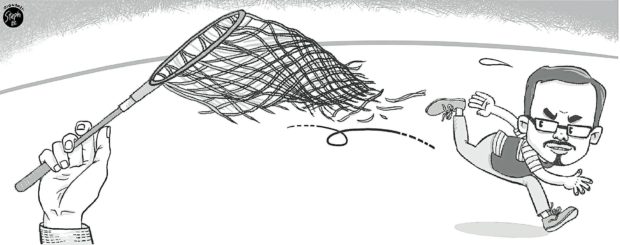Grossly bungled case

The dismissal of a drug trafficking case against suspected Eastern Visayas drug lord Rolan “Kerwin’’ Espinosa by the Makati Regional Trial Court Branch 64 last week represents a shameful debacle in the Duterte administration’s drug war, illustrating the sheer bungling by the police and the prosecution of what it had trumpeted as an exemplar case against the “big fish” in the drug trade.
The court granted the demurrers to evidence filed by Espinosa and his alleged co-conspirators, convicted drug dealer Wu Tuan Yuan aka Peter Co, Lovely Impal, and Marcelo Adorco, citing the failure of the prosecution to “overturn their presumption of innocence.’’ The so-called Espinosa group has the police and the prosecution to thank for the junking of the case involving the alleged trafficking of 20 kilos of shabu seized in a parking lot of a Makati City mall in 2013.
From the very start, this case had been marked by incompetent prosecution and political machinations. At the launch of the brutal drug war in 2016, Espinosa and his slain father Mayor Rolando Espinosa Sr. of Albuera, Leyte, were named by President Duterte as big players in the illegal drug trade in Eastern Visayas. Sometime in August 2016, Mr. Duterte issued a 24-hour ultimatum for the Espinosas to surrender or else the police can “shoot on sight.’’
The elder Espinosa turned himself in and was treated like a VIP, placed under the custody of then Philippine National Police chief Director Gen. Ronald de la Rosa and housed right in his official PNP residence in Camp Crame called the White House (until Dela Rosa complained about the supposed chain-smoking Espinosa and his family.) The mayor confirmed that his son Kerwin, who had gone into hiding, headed a drug network in Eastern Visayas, and hinted that certain politicians were involved.
The elder Espinosa was then killed under shocking circumstances on Nov. 5, 2016, inside his cell at the Baybay jail, after allegedly shooting it out with police officers who came to conduct a search in the wee hours of the morning.
Kerwin Espinosa, fearing he would be killed like his father, sent surrender feelers and was arrested in Abu Dhabi weeks later. Upon his return, he was propped up as some sort of a star witness for the Duterte administration’s campaign against its political nemesis Sen. Leila de Lima. On Nov. 23, 2016, the younger Espinosa claimed that he gave P8 million to De Lima through her driver Ronnie Dayan for her 2016 senatorial campaign.
Meanwhile, the 2013 drug trafficking case against Espinosa, his alleged drug suppliers Peter Co (who is serving a life sentence following his drug conviction in 2001), and Lovely Impal, and Adorco was dismissed in 2017. It was refiled in 2018 after then Justice Secretary Vitaliano Aguirre created a second Department of Justice panel to reinvestigate the case.
But after all these government efforts, Judge Gina Bibat-Palamos granted the demurrers to evidence— which is a motion to dismiss for insufficient evidence—of Espinosa and his co-accused, ruling that the case “necessarily crumbles’’ as the prosecution relied solely on the testimony of witness Adorco which, it turned out, was obtained illegally by the police.
“The court … declared Adorco’s sworn statements as inadmissible in evidence because the same was extracted from him by the police officers in violation of his rights under custodial investigation,” Palamos wrote in her 13-page order.
Adorco said in his demurrer that when the police officers interviewed him in August 2016, no counsel was present. “Worse, Adorco was led to believe that his narration will be used only against Espinosa,” noted the judge. He was not informed that he would be included among the accused and that his narration would be used against him. He recanted his testimony in 2020.
The court ruled that while recantations are viewed with suspicion, the “glaring violations of Adorco’s constitutional rights’’ raised doubts on his initial testimony. It also noted that the testimonies of the police officers were not strong enough to prove that the group conspired to commit the crime, in the absence of first-hand knowledge among them.
And just like that, the supposedly biggest drug lord in Eastern Visayas was able to walk away. Whether the case was doomed to fail by sheer incompetence or by some hideous intentional design, the ignominious collapse of this high-profile case will define the twilight months of the administration’s drug war.
Justice Secretary Menardo Guevarra expressed his disappointment over the dismissal, but said the group was “not off the hook yet.’’
“Sooner or later, the long arm of the law will catch up with these people and they will answer for their crimes,’’ he said — a task, it should be pointed out, that the administration had set as the overarching goal of its drug war. Who will answer now for its gross failure to do so?




















